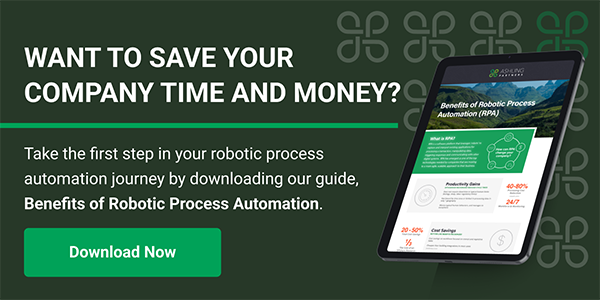In the last blog post we defined Robotic Process Automation (RPA) and provided some examples. Now: the true value of RPA.
In this second post of the three-part series, we will explain why RPA is important regardless of your role in an organization, and how it will significantly impact employees and processes going forward.
RPA vs. outsourcing
RPA is really just another iteration of businesses trying to increase efficiencies and reduce costs in various roles and processes within their organization.Over the past decade, many businesses also have tried to achieve such benefits by employing offshore support. However, offshoring creates various communications issues because of language, culture and time-zone differences, which has resulted in an increased number of hours—and costs—to get the same amount of work accomplished.
As a result, some organizations have tried to make offshore processes as specific, static and as repeatable as possible. But they also could incorporate RPA into these processes to help further reduce labor costs and increase efficiency.
Enterprise-wide values
In fact, outsourcing companies are often the ones leading the movement to RPA because they foresee the efficiency gains that can be achieved by moving to less labor-intensive processes.
The value of RPA is certainly not limited to companies that have outsourced their efforts for a specific process. The benefits that RPA can bring to any organization include:
- Cost Reduction: Automating manual, menial, repetitive tasks that follow a consistent, logical flow can reduce the need for costly human intervention.
- Performance Improvement: Allowing RPA to execute on linear tasks with high accuracy, speed and quality can improve quality assurance.
- Risk Mitigation: There’s less risk associated with decreased reliance on outsourcing partners.
- Increased Innovation: Allowing employees to focus on more innovative and creative projects and tasks can lead to increased thought leadership.
- Workforce Flexibility: Using RPA can help mitigate against the decreasing access to white collar labor as baby boomers continue to retire.
Employee benefits
If you’re a worker and not a decision maker, RPA can still be beneficial to you because it removes the repetitive, administrative work that you’re currently doing. And let’s be honest…you don’t like to do that stuff anyway and you most likely aren’t valued for it.
RPA will allow you to focus more on analyzing data and other work instead of just completing the processes involved in it. And that will significantly increase your value to any organization.
RPA can offer various benefits from the enterprise level all the way down to the employee level by automating tasks and processes that are repetitive and consistent. It can reduce costs, improve consistency (and therefore reduce errors in processing), and potentially provide a better engaging experience for the end customer because these processes now can be done 24/7.
And as more organizations begin implementing RPA and realizing benefits from it, it could possibly overhaul how businesses hire and manage their resources in the future.
In the next blog post we will focus on steps to consider to ensure a successful implementation of RPA. As always, I welcome comments and questions on this blog as a way to keep the dialog going about this exciting resource.
Next Ashling Insight: Steps to a Successful RPA Implementation



